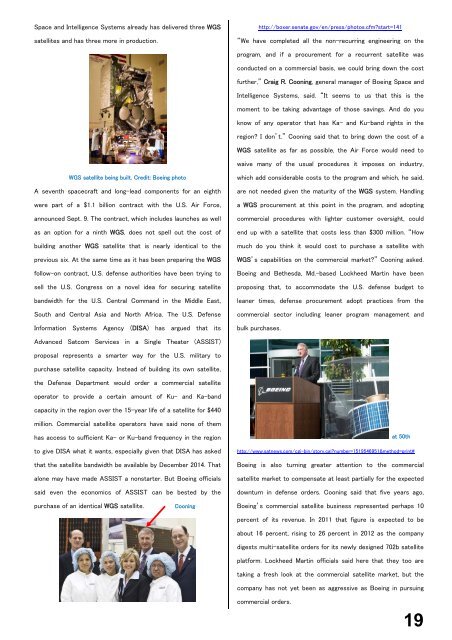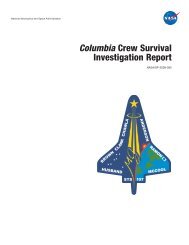24 - Space-Library
24 - Space-Library
24 - Space-Library
You also want an ePaper? Increase the reach of your titles
YUMPU automatically turns print PDFs into web optimized ePapers that Google loves.
<strong>Space</strong> and Intelligence Systems already has delivered three WGS<br />
satellites and has three more in production.<br />
http://boxer.senate.gov/en/press/photos.cfm?start=141<br />
“We have completed all the non-recurring engineering on the<br />
program, and if a procurement for a recurrent satellite was<br />
conducted on a commercial basis, we could bring down the cost<br />
further,” Craig R. Cooning, general manager of Boeing <strong>Space</strong> and<br />
Intelligence Systems, said. “It seems to us that this is the<br />
moment to be taking advantage of those savings. And do you<br />
know of any operator that has Ka- and Ku-band rights in the<br />
region? I don’t.” Cooning said that to bring down the cost of a<br />
WGS satellite as far as possible, the Air Force would need to<br />
waive many of the usual procedures it imposes on industry,<br />
WGS satellite being built. Credit: Boeing photo<br />
A seventh spacecraft and long-lead components for an eighth<br />
were part of a $1.1 billion contract with the U.S. Air Force,<br />
announced Sept. 9. The contract, which includes launches as well<br />
as an option for a ninth WGS, does not spell out the cost of<br />
building another WGS satellite that is nearly identical to the<br />
previous six. At the same time as it has been preparing the WGS<br />
follow-on contract, U.S. defense authorities have been trying to<br />
sell the U.S. Congress on a novel idea for securing satellite<br />
bandwidth for the U.S. Central Command in the Middle East,<br />
South and Central Asia and North Africa. The U.S. Defense<br />
Information Systems Agency (DISA) has argued that its<br />
which add considerable costs to the program and which, he said,<br />
are not needed given the maturity of the WGS system. Handling<br />
a WGS procurement at this point in the program, and adopting<br />
commercial procedures with lighter customer oversight, could<br />
end up with a satellite that costs less than $300 million. “How<br />
much do you think it would cost to purchase a satellite with<br />
WGS’s capabilities on the commercial market?” Cooning asked.<br />
Boeing and Bethesda, Md.-based Lockheed Martin have been<br />
proposing that, to accommodate the U.S. defense budget to<br />
leaner times, defense procurement adopt practices from the<br />
commercial sector including leaner program management and<br />
bulk purchases.<br />
Advanced Satcom Services in a Single Theater (ASSIST)<br />
proposal represents a smarter way for the U.S. military to<br />
purchase satellite capacity. Instead of building its own satellite,<br />
the Defense Department would order a commercial satellite<br />
operator to provide a certain amount of Ku- and Ka-band<br />
capacity in the region over the 15-year life of a satellite for $440<br />
million. Commercial satellite operators have said none of them<br />
has access to sufficient Ka- or Ku-band frequency in the region<br />
to give DISA what it wants, especially given that DISA has asked<br />
that the satellite bandwidth be available by December 2014. That<br />
alone may have made ASSIST a nonstarter. But Boeing officials<br />
said even the economics of ASSIST can be bested by the<br />
at 50th<br />
http://www.satnews.com/cgi-bin/story.cgi?number=1519546951&method=print#<br />
Boeing is also turning greater attention to the commercial<br />
satellite market to compensate at least partially for the expected<br />
downturn in defense orders. Cooning said that five years ago,<br />
purchase of an identical WGS satellite.<br />
Cooning<br />
Boeing’s commercial satellite business represented perhaps 10<br />
percent of its revenue. In 2011 that figure is expected to be<br />
about 16 percent, rising to 26 percent in 2012 as the company<br />
digests multi-satellite orders for its newly designed 702b satellite<br />
platform. Lockheed Martin officials said here that they too are<br />
taking a fresh look at the commercial satellite market, but the<br />
company has not yet been as aggressive as Boeing in pursuing<br />
commercial orders.<br />
19
















